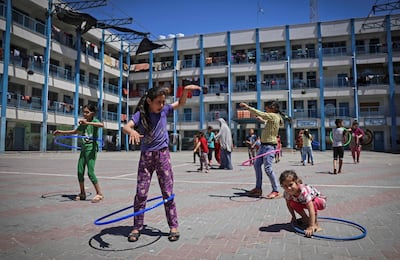Even in war, a clown always brings a smile.
Wearing a funny suit, Abed Al Kader plays with children inside the Jadida school in Gaza city, one of the several that have been turned into a shelter by the United Nations Relief and Works Agency, following the latest confrontation between Hamas and Israel.
"I came here to deliver a message that happiness still reigns in Gaza, despite the sadness and the devastation," the 28-year-old Abed, affectionately called Amo Abodo, told The National. "The children are afraid by the shelling, so we are trying to entertain them a little."
For the tenth day, Israel bombarded Gaza with air strikes, with Palestinian armed factions keeping up cross-border rocket fire. Gaza medical officials say 219 Palestinians have been killed, including 64 children, and more than 1,570 wounded since the fighting began. Israeli authorities say 12 people have been killed in Israel, including two children.
Amid the relentless air strikes, the UNRWA has turned the schools it runs in the area into shelters for the displaced. Nearly 450 buildings in the Gaza Strip have been destroyed or badly damaged, including six hospitals and nine primary-care health centres, according to UN estimates. Some 50,000 displaced people have sought cover in the schools, UNRWA spokesman Adnan Abu Hasna said.
But the growing number of refugees has led to another raging problem – infection from Covid-19. Despite requests by the authorities, people are careless about wearing masks or keeping a safe distance.
"The situation inside the schools is dangerous," Mr Hasna told The National. "There is a risk of the virus spreading because of the crowding."
The threat has been compounded by the fact that all coronavirus-related services have stopped after the central laboratory, where Covid-19 tests were conducted, was destroyed by the shelling, Medhat Abbas, general director at Gaza's health ministry, told The National.
Earlier, people were asked to keep about 2 metres apart, but with the limited space in schools, that is difficult, Mr Abbas said.
"There are hardly any protection procedures being followed by the people inside the shelters," he said.
The UNRWA has called on Israel to enable access to Gaza so it can provide essential supplies to provide relief to the distressed.
"There is no reason to prevent access and weaken critical assistance to the most affected people in Gaza," UNRWA Commissioner-General Philippe Lazzarini said on Twitter. "More than ever, humanitarian truce and humanitarian access should be granted. Awaiting urgent approval to cross into Gaza."
In all, 19 health facilities have been damaged, including six hospitals. One clinic has been destroyed. The UNRWA is providing clean water, sanitisers and face masks, and also distributing leaflets describing the dangers of the virus, Mr Hasna said.
Some are heeding the UN's call. Um Mohammed Habob has tried to segregate her small area with blankets and sheets of plastic. When she arrived five days ago from the northern part of the Strip, the 45-year-old mother of seven children even brought with her her small oven so she could cook her own food and avoid contamination.
"I am trying to keep away from people in the school, because the situation here so scary and dangerous,” Ms Habob said.
Indeed, the war has come as a double whammy at a time when less than 2 per cent of Gaza's population has received a vaccine. Some 54 people tested positive out of just 211 lab samples taken, according to figures published last week. In comparison, 398 people were found positive out of the 1,525 samples tested, just two days before the conflict began.
Tahani Saed, 35, left her house in the east of the city to come and stay with her husband and two of her children at the Al Shatee school. But while feeling protected from the shelling, she is less sure of contracting the virus.
“I left my home as the area was not safe, but I feel I am not safe here either,” said Tahani, who also has a heart ailment. “There are about 50 people inside one room.”
Still, some like 14-year old Ali Sultan have tried to make the best of the situation. To make a living, he has started selling chips, chocolates and biscuits to the children. While the goodies are tempting, the fact that Ali doesn't wear a mask or follow safety protocols exposes his customers to risk.
Meanwhile, the only joy the children can be part of comes from Clown Abodo, who makes a fervent appeal.
"We want the world to look at these children with mercy," Abed said. "They are guilty of nothing to have to live in this situation."















